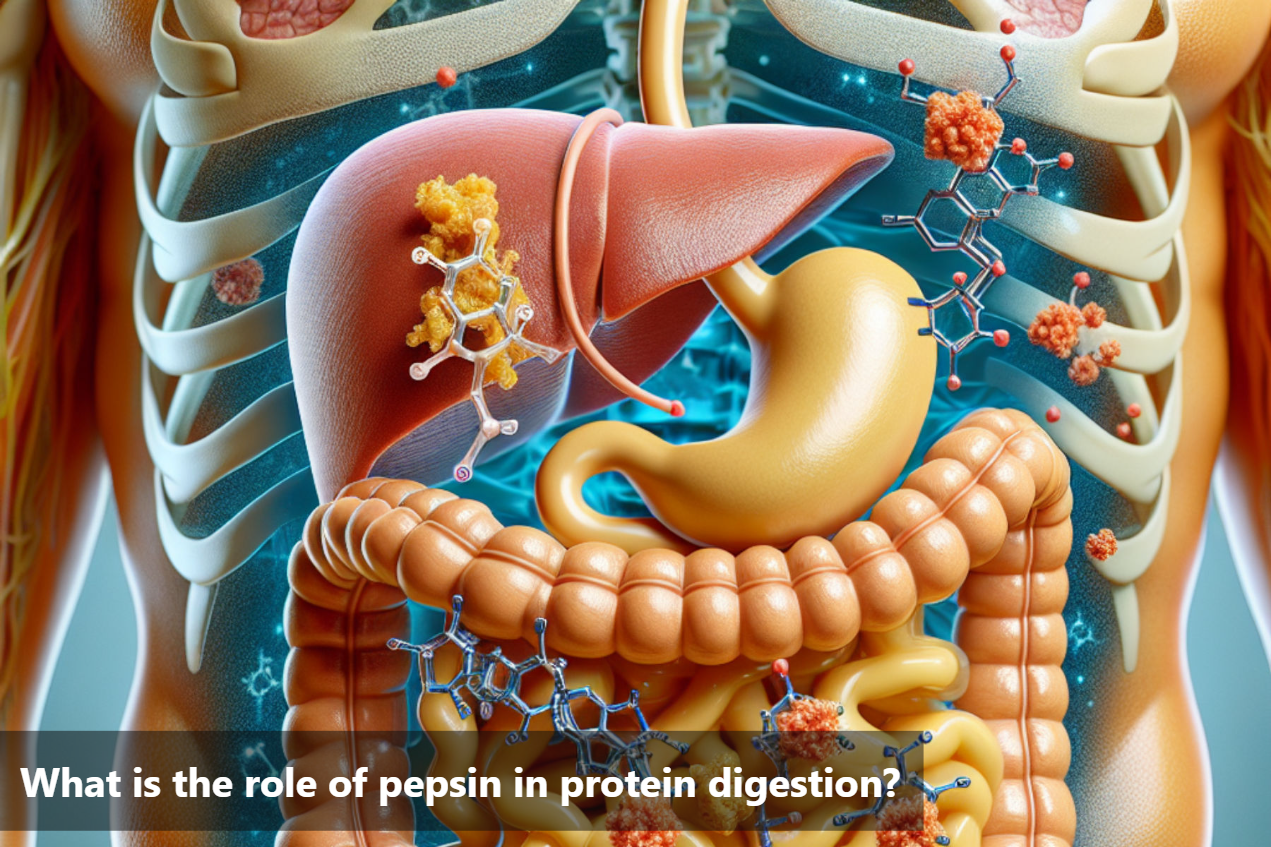
What is the role of pepsin in protein digestion?
Protein digestion is a crucial process that allows our bodies to extract essential nutrients from the food we consume. Among the key players in this process is pepsin, an enzyme that plays a vital role in breaking down proteins into smaller, more digestible components such as peptides and amino acids.
When we eat protein-rich foods, the protein molecules must be broken down into smaller fragments for proper absorption in the digestive system. This is where pepsin comes into play. Pepsin, primarily produced in the stomach, works by breaking down the long protein chains into shorter chains and eventually into individual amino acids. These amino acids are then absorbed by the body to support various physiological functions.
As an integral component of protein digestion, pepsin's effectiveness is crucial for the overall nutrient absorption process. Understanding the role of pepsin in protein digestion is fundamental to appreciating the intricate mechanisms that enable our bodies to derive energy and sustenance from the foods we consume.

What is Pepsin?
Pepsin, a key enzyme in our digestive system, plays a vital role in breaking down proteins into smaller compounds for better absorption. Structurally, pepsin belongs to the family of proteolytic enzymes and is produced in an inactive form known as pepsinogen. Upon contact with the acidic environment of the stomach, pepsinogen converts into its active form, pepsin, to initiate protein digestion.
Functionally, pepsin primarily targets proteins and starts the hydrolysis process by breaking peptide bonds between amino acids. This enzymatic activity occurs in the stomach, specifically in the gastric mucosa, where the low pH level aids pepsin's effectiveness. By cleaving proteins into peptides and eventually into amino acids, pepsin ensures optimal nutrient absorption in the small intestine.
Understanding the nature of pepsin is crucial in comprehending its significance in the overall digestive process. Its specificity towards proteins underscores its essential role in the intricate mechanism of protein digestion, facilitating the body's absorption of essential nutrients from the food we consume.
In essence, pepsin acts as a catalyst in protein breakdown, enabling the body to utilize these macronutrients effectively. Its presence and activity exemplify the meticulous orchestration of enzymes within our digestive system, highlighting the specialized functions aimed at maintaining our overall health and well-being.
Role of Pepsin in Protein Digestion
Pepsin plays a crucial role in the process of protein digestion within the human body. As a digestive enzyme primarily found in the stomach, pepsin is responsible for breaking down complex protein molecules into smaller peptides and amino acids. This breakdown is essential for the absorption and utilization of proteins by the body.
When we consume protein-rich food, such as meat or beans, pepsin is activated in the acidic environment of the stomach. It starts this process by targeting specific peptide bonds within the protein structure. By cleaving these bonds, pepsin breaks the proteins into shorter chains of peptides, which are then further digested into individual amino acids.
The action of pepsin is particularly important because the body needs amino acids for various functions like building muscles, repairing tissues, and producing hormones. Without the breakdown facilitated by pepsin, our bodies would struggle to extract the necessary nutrients from protein sources.
Factors Affecting Pepsin Activity
One significant factor is the pH level of the environment in which pepsin is functioning. Pepsin works optimally in a highly acidic environment, such as the stomach, where the pH is low. Any fluctuations in pH levels can directly impact the activity of pepsin and its ability to break down proteins effectively.
Enzyme concentration is another vital factor affecting pepsin activity. The concentration of pepsin present in the digestive system directly influences its efficiency in catalyzing the breakdown of proteins into smaller peptides. Insufficient levels of pepsin may result in incomplete protein digestion, leading to potential digestive issues.
Moreover, temperature plays a crucial role in the activity of pepsin. Pepsin functions optimally at body temperature, and any significant deviations from this temperature range can affect its performance. Extreme temperatures can denature the enzyme, rendering it less effective in breaking down proteins.
In addition to pH, enzyme concentration, and temperature, the presence of inhibitors or activators can also impact pepsin activity. These substances can either enhance or inhibit the enzymatic activity of pepsin, thereby influencing the overall protein digestion process. Understanding and regulating these factors are essential in optimizing the role of pepsin in protein digestion efficiently.

Pepsin: Key Enzyme in Digesting Proteins
Pepsin plays a vital role in the digestion of proteins within the human body. It is an enzyme produced in the stomach that functions in breaking down complex protein molecules into smaller peptides and amino acids, aiding in their absorption.
Understanding the significance of pepsin in protein digestion is essential for comprehending how our bodies extract essential nutrients from the foods we consume. Without pepsin, the process of protein breakdown would be inefficient, leading to potential nutrient deficiencies.
Moreover, the activity of pepsin can be influenced by various factors such as pH levels in the stomach, temperature, and the presence of certain inhibitors. Maintaining an optimal environment for pepsin activity is crucial for efficient protein digestion and nutrient absorption.
Pepsin serves as a key player in the intricate process of protein digestion, ensuring that proteins are broken down effectively to support overall health and well-being. Appreciating the role of pepsin can help individuals make informed dietary choices to promote better digestion and nutrient utilization.
This Blog post is an initiative by Lo! Foods, to provide accurate and Nutritionist / Doctor approved information related to Health. Lo! Foods is India's leading brand for Everyday Functional Foods. Foods designed for specific Health conditions or Needs. Lo! Foods also runs India's largest range of Low Carb Healthy Cloud Kitchens, under the brand names of Lo!, ProteinChef, ATH (All Things Healthy) and DiabeSmart.















Leave a comment
Your email address will not be published.